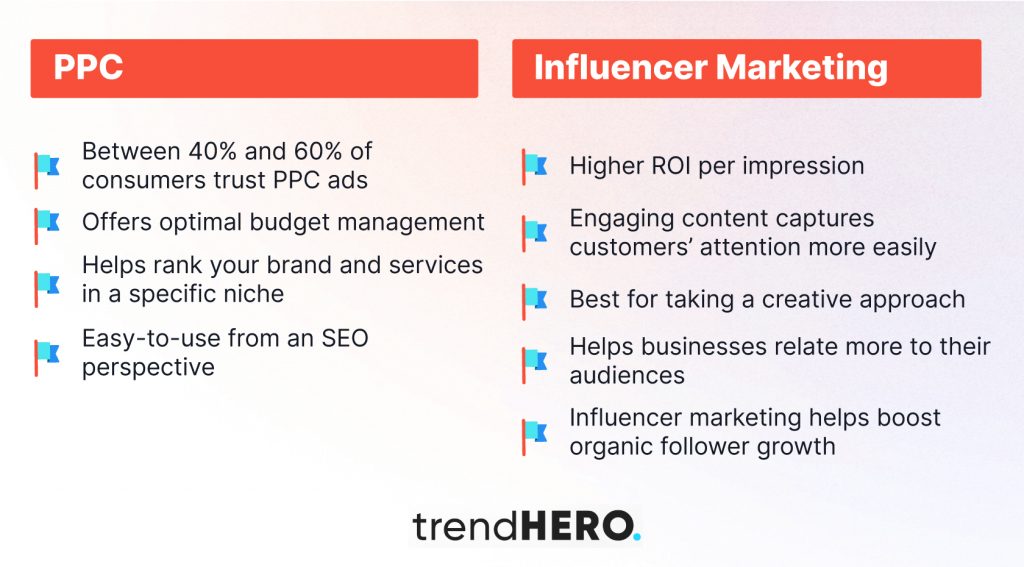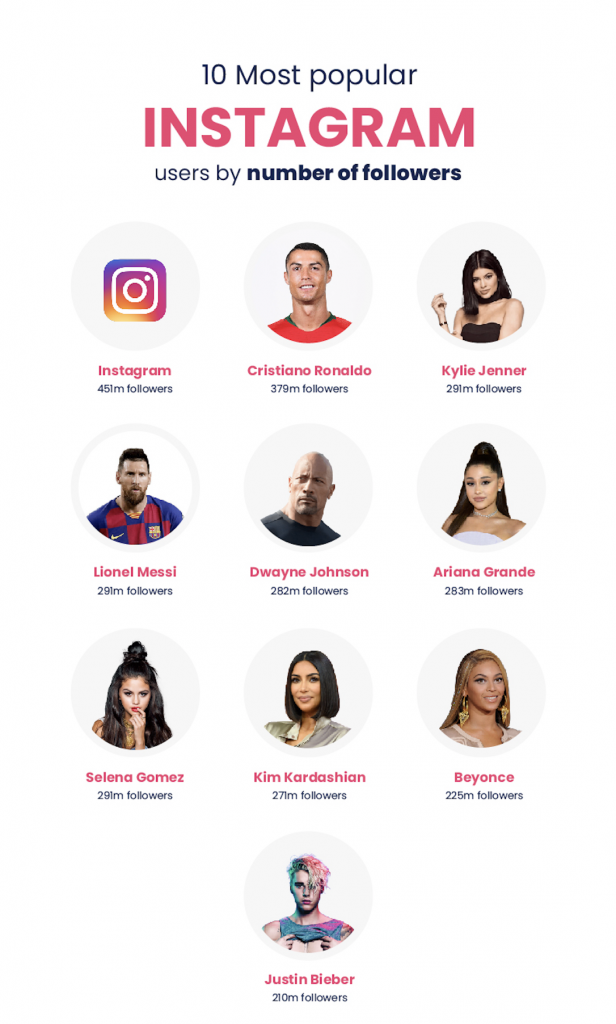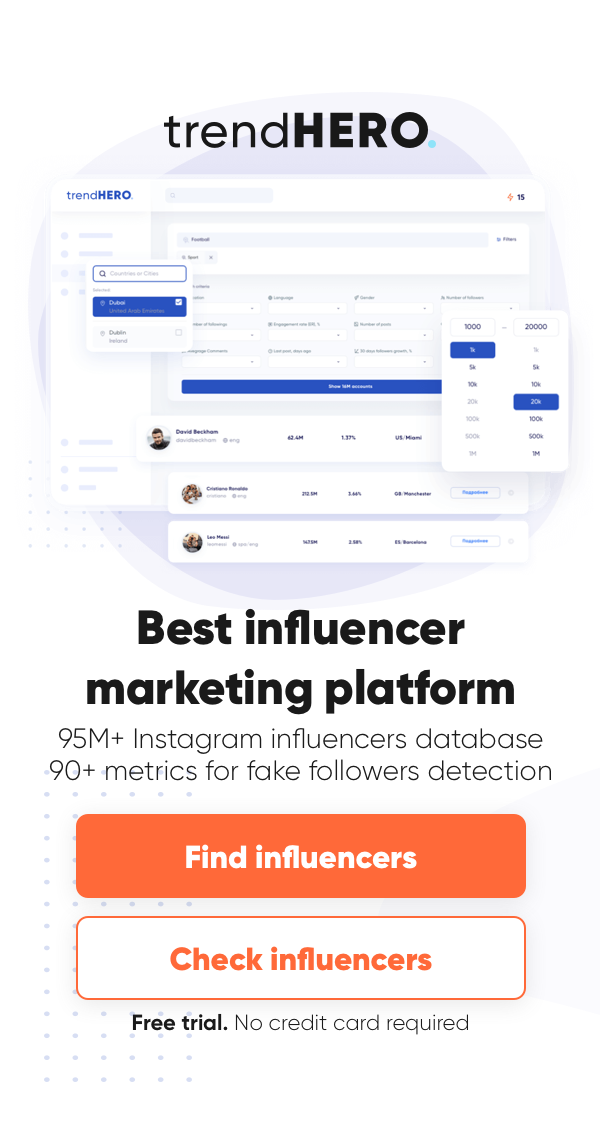- Home
- BLOG
- Instagram Marketing
- PPC vs Influencer Marketing: Which One Is Best for e-Commerce Conversion?
When you spend time developing a marketing strategy, it’s important to ask whether PPC vs influencer marketing is the best option.
Influencer marketing has skyrocketed in popularity with the growing popularity of online personalities and their effect on impressionable audiences. However, PPC can also be beneficial, especially when used alongside influencer marketing rather than alone.
Thus, let’s explore the pros and cons of influencer and PPC marketing and how they can be used together.
PPC vs Influencer Marketing: At a Glance
Let’s take a quick look at a few of the most notable differences between PPC vs influencer marketing.

What Is Influencer Marketing?
When we think of social media today, most people see it as a type of marketing platform to boost brand awareness and sales.
Even though social platforms initially started as a way to keep in touch with friends and family, businesses quickly monetized social media through influencer marketing campaigns.
Influencer marketing is ideal if you’re looking for an effective form of marketing that will reach your target audience and offer impressive conversion rates. With this method, the most important asset is your list of influencers.
These will be social media users with the highest number of followers, but they also get plenty of engagement on each post. You will enter an agreement with these personalities to pay them in exchange for a post of your choosing to be added to their feed.
Some social media marketing techniques are to post a regular photo on the influencer’s feed. An even more attractive solution is to post an Instagram Story with engaging content to lead potential customers down your sales funnel.
Another popular form of marketing companies use with influencers is long-term brand partnerships.
With long-term partnerships, you’ll pay an influencer for a certain number of monthly posts to reach your target audience. Also known as an influencer campaign can be a phenomenal way to optimize your marketing efforts and reach a massive audience with far less work.
What Are the Benefits of Influencer Marketing?

There are a few remarkable benefits that influencer marketing brings to the table, including:
1. Driving Sales
Influencers are one of the most popular forms of marketing for several reasons.
First, influencer posts help to drive sales. Instead of trying to capture your audience at the top of these sales funnel, influencer marketing brings clients through the funnel until they make a purchase.
It’s a surefire way to attract a massive audience that is guaranteed to make purchases through social media platforms. You’ll find it even has the potential to become more effective than other digital marketing efforts, like email marketing.
2. Boosting ROI
Did you know that some studies have found influencer marketing can offer over 11x higher ROI than standard advertising practices?
That said, it easily makes it one of the most cost-effective solutions by mastering the power of social media posts and staying within your marketing budget. Because as per the study revealed by Stormlikes, almost 3 billion followers are covered by the top 10 Instagram users including Ronaldo, Kylie, and Messi. So you can imagine how big is the market reach.

When you enter an agreement with an influencer to market your products, you’ll usually pay a one-time fee. It means you won’t have to pay out of pocket for each click an ad gets.
Also, both parties agree on a specific flat-rate cost before purchasing the ad, so you always know what you’re paying for.
Once you’ve paid the initial influencer fee, all your income afterward will be pure profits, giving you a much higher ROI over time.
3. Bypassing Adblocks
Adblockers were never as big of a concern for advertisers as they are today.
The more social media platforms add advertisements to their content, the more likely everyday browsers are to begin using adblockers. These unique programs prevent ads from popping up on the viewer’s screen, meaning fewer people engage with your brand’s content and learn about your products and/or services.
However, this is where influencer marketing becomes one of your best friends.
With influencers, you won’t have to place a 30-second ad before a video that can easily be skipped or avoided with an ad blocker. Instead, you’ll use a popular personality to talk to their audience and insert the ad organically in their content.
Let’s use Hello Fresh as an example. Known for their influencer partnerships, they often have influencers cook family meals at some point in their vlog to capture audiences’ attention while spreading brand awareness.
It’s a far more organic and relatable way to insert their product into digestible content.
4. Skipping Straight to Trust

One of the most important factors of marketing trends is for brands to establish trust with their relevant audience. Without trust, customers will be far less likely to make a purchase and less likely to recommend a company to others.
When using influencer marketing, you don’t have to build trust with a customer yourself, as the influencer is doing it for you. These professionals help you reach your business goals by recommending your products to their audience.
As the influencer’s followers already trust them, their promotional posts will likely be more engaging and enticing.
Over time, you’ll notice you’ll experience significantly higher engagement rates and get a larger market share in your niche.
What Are the Downsides to Influencer Marketing?
Although it comes with a massive number of benefits, influencer marketing also has a few disadvantages to note, namely:
1. No Guaranteed Results
When you use influencer marketing to learn how to boost Instagram followers, there aren’t any guaranteed results. You can’t guarantee that all the influencer’s followers will see their post, let alone engage with it.
All of the predictions for the success of your campaigns will be nothing more than preemptive guesses.
A great way to understand this issue is to look at the sponsored vs. unsponsored posts on an influencer’s page. Unsponsored posts tend to do significantly better regarding engagement than sponsored posts.
Therefore, you cannot gauge the success of influencer advertising by the regular posts on an influencer’s feed.
2. Less Control
Business owners who prefer more control over advertising are bound to find influencer marketing less appealing. You won’t be able to tailor your advertisement to reach 100% of your target audience, as the reach of your ads is entirely dependent on the quality of the influencer’s followers.
According to Likes.io if 70% of their follower base is within your target audience, while the other 30% is irrelevant in all aspects. So, it’s nearly impossible to control it.
3. Likely Costly
If you don’t have thousands to spend on influencer marketing, opting for organic posts and PPC is a far better alternative.
Most influencers understand the importance of their platform and how it can make a massive difference to a company’s bottom line. As such, the rates for hiring influencers have skyrocketed over the years, with many charging several thousand for a single post on their feed.
You need to pay for it if you’re looking to reach a massive audience base through an influencer’s core audience. Most small brands find it exceptionally challenging to reach active users in their niche.
What Is PPC Advertising?

PPC (Pay-Per-Click) advertising is another popular option for businesses looking to master search engine ads and spread brand awareness.
PPC ads are a unique opportunity for brands less interested in partnering with online communities. Although they don’t offer as much creative freedom as influencer content, PPC ads can be a great option to manage your budget while also harnessing the power of SEO (search engine optimization).
With Pay-Per-Click advertisements, companies will place social media ads on platforms such as Facebook, Instagram, or Twitter. As its name suggests, you’ll be charged a specific flat rate fee every time a prospective customer clicks on your ad.
It’s important to note that if you don’t have a specific budget, PPC can be expensive, but it also gives you complete control over your spending.
What Are the Benefits of PPC Ads?
Let’s jump into a few of the most notable benefits of this social media strategy to acquire a much larger audience.
1. Performance-Based Payments
One of the main reasons people prefer PPC to influencer marketing is that you’ll pay only for how well your ads perform.
When working with an influencer, you’re putting a lot of trust into them as a professional. You’re hoping they post the approved content on time while ensuring they tag your brand and represent you professionally.
With PPC, you don’t have to rely on anyone else to ensure your content marketing performs as you need it to. You’re in full control of all the settings, such as when the ads will be pushed, what content is in the ads, and what platforms will display them.
You’ll only have to pay for the ads depending on how many times they’re clicked, rather than being roped into a flat-rate fee.
2. Full Budget Control
There’s no doubt social marketing can be intimidating for new businesses, especially when developing your first content marketing strategy.
Fortunately, PPC is one of the simplest methods to use when you’re ready to start advertising, and it’s completely budget-friendly. You can choose to start or stop your campaign whenever you want, making it easy to stay within a specific budget to prevent overpaying for advertising.
Another unique feature of this platform is that you can input a specific budget before starting. If the advertising campaign reaches your threshold, it will automatically be stopped to prevent an overage of charges.
3. Boosting Brand Exposure
Advertising for growth is something every business needs to consider, as well as advertising optimization.
PPC is a fantastic solution for both of these avenues while reducing advertising spending and boosting advertising profits. When you use pay-per-click, you’ll input specific keywords into your ads, which undoubtedly helps with optimization.
As clients search for products related to what you have to offer, your ads are more likely to appear on their search engine result pages. It means you’ll be reaching a larger audience without having to put half as much effort into the process.
It’s also fantastic for increasing your overall exposure without paying the high rates that influencers often charge.
4. Real-Time Tracking
Digital advertising is nothing without an assortment of metrics and statistics.
As someone hosting a PPC campaign, you can always keep track of your advertising goals in real-time. Most platforms, such as Google AdWords, come with tracking tools to show your campaigns’ success.
There are plenty of other data points you can collect, including:
- The average cost of each ad you have running
- Where customers are seeing your ads the most
- General demographic information about your target audience
- Average cost per conversion for each campaign
- Advanced keyword statistics
Sure, with influencer tracking you could always ask for this information from the influencer you’re working with. However, it isn’t as readily available as it would be with your advertising campaign.
What Are the Downsides to PPC?
Like influencer marketing, PPC is an excellent option for several reasons, but it isn’t without its flaws.
Let’s look at a few of the most notable cons of this advertising method when it comes to captivating followers and sales.
1. Challenging Keyword Bidding
When setting up your PPC advertising campaign, you’ll need to choose the specific keywords you want your ads to rank for. That said, it can be highly competitive and expensive, especially if you’re in a competitive niche.
You might find massive brands have outbid you for the same keywords, putting their ads at a higher priority than yours.
Over time, you might need to surrender the ads you’ve ranked for because they become too expensive. Or, you would need to put more money into your advertising budget to keep your ads relevant.
2. Clicks Don’t Mean Sales
Unlike influencer marketing, PPC is designed to attract more clicks before sales. The entire premise of this marketing method is to get more people to click on your ad so they can be brought into your sales funnel.
As such, you cannot guarantee that each click will turn into a sale, which is why all other conversion methods are essential to focus on with PPC.
PPC vs Influencer Marketing: Which Is Best?
Deciding between PPC vs influencer marketing depends on your business needs.
Influencer marketing is ideal if you’re looking for access to more potential sales while reaching a community of followers. On the other hand, PPC is a cost-effective solution to reach your target market using SEO rather than content users.
Regardless of your choice, both options can help to boost awareness of your products and brand. They can also be used together to create a foolproof marketing campaign that captures your audience from every direction.
About the Author:
Uday Tank is a serial entrepreneur and content marketing leader who serves the international community at Rankwisely. He enjoys writing, including marketing, productivity, business, health, diversity, and management.

Instagram Engagement Rate Calculator For Free
Check any influencer's Engagement rate and analyze his or her followers growth history
Other free tools: Follower Count History, Instagram Follower Count, CPM Calculator






